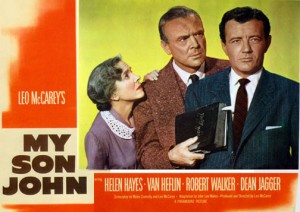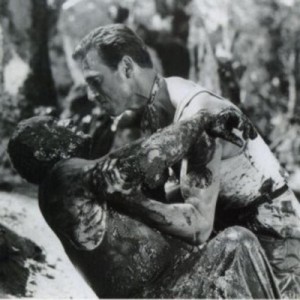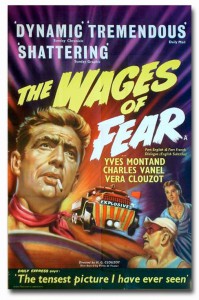Written in July 2008 for an issue of Stop Smiling devoted to Washington, D.C. In a way, the recent Arrival might be said to qualify as a mystical remake of The Day the Earth Stood Still, and I found it every bit as gripping. — J.R.


To get the full measure of what Cold War paranoia was doing
to the American soul, two of the best Hollywood A-pictures
of the early 50s, each of which pivots around its Washington,
D.C. locations – The Day the Earth Stood Still (1951) and My
Son John (1952) — still speak volumes about their shared zeitgeist,
even though they couldn’t be further apart politically.
An archetypal liberal parable in the form of a science fiction
thriller and an archetypal right-wing family tragedy (with deft
slapstick interludes) that’s even scarier, they’re hardly equal in
terms of their reputations. Leo McCarey’s My Son John, widely
regarded today as an embarrassment for its more hysterical elements,
has scandalously never come out on video or DVD [2014 footnote, it’s
now available from Olive Films], though in its own era it garnered
even more prestige than Robert Wise’s SF thriller, having received
an Academy Award nomination for best screenplay. Read more
From the Chicago Reader (March 1, 1992). — J.R.

In Henri-Georges Clouzot’s 1953 suspense classic, four out-of-work Europeans (Yves Montand, Charles Vanel, Folco Lulli, Peter Van Eyck), trapped in a squalid South American village that’s exploited by a U.S. oil company, agree to drive two truckloads of nitroglycerine over 300 miles of primitive roads in exchange for $2,000 eachif they survive. When this existentialist shocker opened in the U.S., 43 minutes had been hacked away, but the gripping adventure elements left intact were still enough to turn the film into a hit. (This restored and at least semicomplete version of the film, 148 minutes long, was released in the early 90s.) A significant influence on Peckinpah’s The Wild Bunch, this grueling pile driver of a movie will keep you on the edge of your seat, though it reeks of French 50s attitude, which includes misogyny, snobbishness, and borderline racism. It’s also clearly a love story between two men (Montand and Vanel). In French with subtitles. (JR)
 Read more
Read more
Chapter Four of my book Movie Wars. It was originally written for Another Kind of Independence: Joe Dante and the Roger Corman Class of 1970, a critical collection coedited with Bill Krohn for the Locarno International Film Festival in 1999, which came out in French and Italian editions. –– J.R.
During the spring of 1998, not long before the American release of Small Soldiers, I happened upon “The Toys of Peace,” a wise and wicked tale by Saki included in A. S. Byatt’s recent collection, The Oxford Book of English Short Stories. Set in 1914, it recounts the noble and doomed efforts of the hero to interest his two nephews, aged nine and ten, in “peace toys”: models of a municipal dustbin and the Manchester branch of the YWCA, lead figurines of John Stuart Mill, Robert Raikes (the founder of Sunday schools), a sanitary inspector, and a district councillor. Forty minutes later, he looks in on the boys and finds that they’ve converted these objects into war toys: the municipal dustbin punctured with holes to accommodate the muzzles of imaginary cannons, Mill dipped in red ink to approximate an eighteenth‐century French colonel, with a grisly game plan mapped out to yield a maximum amount of bloodshed, including the remainder of the red ink splashed against the side of the YWCA building.
Read more




